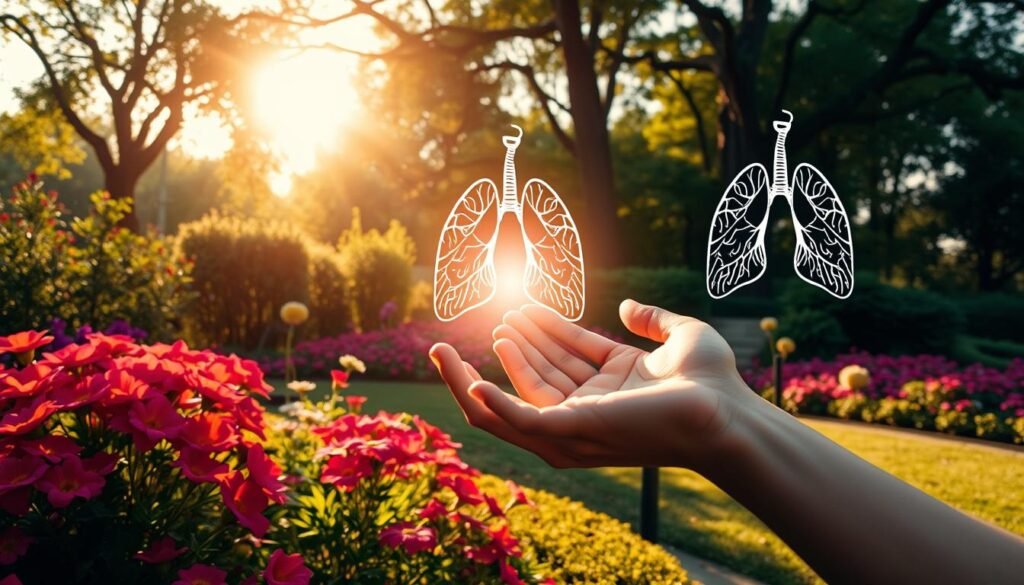Did you know that around 24% of stage IV lung cancer patients live past five years? This shows the incredible strength of those facing a tough diagnosis. Lung cancer is often seen with fear. Yet, stories from patients of different lung cancer types offer hope, bravery, and support. We’ll share inspiring survivor stories, focusing on their journeys and victories.
These stories reveal the power of sharing experiences. They not only showcase individual fights but also bring people together. Whether it’s beating NSCLC or sharing survivor stories, these tales lift spirits. They show us that, despite challenges, hope shines through.
Key Takeaways
- Survival rates for lung cancer patients can defy expectations.
- Community support is key in dealing with challenges.
- Personal stories offer hope and strength to those battling lung cancer.
- Keeping active and having goals helps with recovery.
- Educational resources improve understanding and disease management.
- Research and advocacy are crucial for better treatments.
The Power of Personal Accounts in Lung Cancer Journeys
Personal stories of lung cancer treatment are very important. They help not just patients but also caregivers. These stories share the highs and lows of facing lung cancer. They show people they’re not alone and build a supportive community.
Take Karen Ballaban’s story, for example. After beating COVID-19, she was diagnosed with lung cancer related to a genetic issue. Her battle included three rounds of chemotherapy and surgery. Karen’s story is powerful. It shows how family support can make a big difference during treatment.
Joining support groups and sharing stories online helps patients cope. This sharing helps everyone understand lung cancer better. By reading about others’ battles, patients and families can feel stronger together. Find more about sharing these stories at cccnevada.com.
| Aspect | Details |
|---|---|
| Patient | Karen Ballaban |
| Lung Cancer Type | Non-Small Cell Lung Cancer |
| Genetic Mutation | EGFR exon 19 deletion |
| Treatment | Three rounds of chemotherapy |
| Surgery | Lobectomy to remove upper lobe of left lung |
| Scheduled Check-Ups | Every three months |
Patient Stories for Different Lung Cancer Types
Hearing from those who’ve fought lung cancer offers deep insight. Their stories reveal bravery in facing this disease’s challenges. Each narrative is both moving and motivating, showing their strength.
Non-Small Cell Lung Cancer Experiences
Most lung cancers are classified as Non-small cell lung cancer (NSCLC). They make up about 85% to 95% of cases. Each person’s fight is unique, showing diverse outcomes. For example, Bill found new hope with biomarker tests. This led to a treatment tailored just for him, changing his future.
Gerri lives well after her stage 4 EGFR+ NSCLC diagnosis. She stays positive, encouraging others to keep fighting. Colleen teaches about lung cancer’s dangers, using her story to raise awareness.
Small Cell Lung Cancer Patient Narratives
Small cell lung cancer (SCLC) accounts for 12% to 13% of cases. It’s tough but patients like Tejal fight with determination. She keeps a positive outlook, showing the power of mental strength. The 2018 advent of immunotherapy has offered new hope to many.
Early symptoms, like fatigue, affected Marley, even as a young mom. It’s vital to recognize and treat symptoms quickly. Xavier is bringing awareness to lung cancer, especially among military folks. Each story, NSCLC or SCLC, showcases human resilience.
Julie found out she had lung cancer during a routine check-up. And Jeff keeps busy even with a stage 4 diagnosis. Each story shows the immense strength of lung cancer fighters. They highlight the need for support, early detection, and ongoing education. For more stories, visit here.
Real-Life Experiences with Lung Cancer
Exploring real-life experiences with lung cancer shows its deep impact. Each story teaches us about the emotional and physical paths of patients. They bring hope and knowledge to others.
Surviving the Diagnosis
Getting diagnosed with lung cancer is hard. Many people talk about their fear and confusion when they first hear the news. But, they also find strength within themselves and from others.
Stories of lung cancer highlight the role of support from loved ones and healthcare teams. They help patients handle the emotional toll of their diagnosis.
Emotional Resilience Throughout Treatment
Emotional strength is key during treatment. Patients share how staying hopeful and positive helped them. They discuss ways to cope with mental and physical challenges.
Connecting with others, counseling, and mindfulness are common tactics. These methods lessen anxiety and create bonds between survivors.
Inspiring Stories of Lung Cancer Survivors
Many face great challenges after a lung cancer diagnosis. Yet, the stories of survivors bring hope and show the strength of never giving up. These tales emphasize recovery chances and the value of support from others.
Hopeful Recoveries and Second Chances
Some survivor stories are especially moving because of their hope and will. A 52-year-old ran a 5K race after losing half of their left lung. This shows there are opportunities for new beginnings after cancer. Crystal Stophel, who was diagnosed with stage 4 lung cancer at 40, also proves life can hold significant moments, even in tough times.
Community Support in Recovery Processes
The role of community in recovery is crucial. Support groups and organizations provide resources and emotional support for healing. Feeling connected and understood by others in similar situations offers hope and a sense of belonging. For example, Darlene Kern got early detection and help through her support network. Her recovery shows how vital support from others can be.

| Name | Diagnosis | Age at Diagnosis | Recovery Milestone |
|---|---|---|---|
| A 52-year-old | Half lung removal due to lung cancer | Varies | Completed a 5K race |
| Crystal Stophel | Stage 4 lung cancer | 40 | Inspired others with her resilience |
| Darlene Kern | Early-stage lung cancer | Varies | Credit to community support |
These inspiring stories and testimonials keep the narrative of hope alive. Each path highlights the power of personal strength and the importance of community bonds.
Lung Cancer Warrior Stories from Diverse Backgrounds
Lung cancer warrior stories shed light on the personal battles of those affected. Veterans and women share their unique experiences, marked by resilience and advocacy. Their stories aim to inspire and bring hope.
Veterans Facing Lung Cancer
Veterans with lung cancer often link their illness to military service. They struggle with late diagnosis and complex healthcare systems. Notably, a veteran who was diagnosed at 28 with small cell lung cancer experienced chest pain and coughing.
After several wrong diagnoses, a biopsy revealed a 15 cm mass. The treatment plan included chemotherapy and radiation. This veteran found power in speaking up and helping others in the cancer community.
Women’s Unique Experiences with Lung Cancer
Women face distinct challenges with lung cancer. They deal with specific health issues like managing fatigue and dealing with hair loss. There’s a story about a woman who used her background as an educator to stay positive.
She highlights the importance of support and raises awareness. Her work focuses on diversity in cancer research and helping other women. She shows us that resilience and support can create hope.
Testimonies of Hope: Lung Cancer Survivor Testimonials
People who beat lung cancer often tell stories full of highs and lows. These lung cancer survivor testimonials don’t just talk about the tough times. They also share the lessons they learned fighting lung cancer, bringing hope to others. Their tales unfold moments of change that helped them heal and see life differently.
Lessons Learned and Shared Insights
Each story shared by a survivor comes with important lessons. Take Adrian Cheong’s experience, for example. He was diagnosed with stage 4 lung cancer, which had spread to his brain and spine. Despite this, aggressive treatment helped him bounce back. He was back teaching in four months, sharing his journey with students to teach them about life and healthcare.
There’s also the story of someone who found out about their early-stage lung cancer through genetic testing. This discovery pointed them towards the right treatment quickly. Early detection and treatment can lead to longer, better lives for patients.
Influential Moments in Their Healing Journeys
Survivors like Adrian remember key moments when they began to feel strong again. After his recovery, Adrian could do things like kayaking and playing tennis. These moments mean more than just getting back to normal. They show a deep appreciation for life, even when it’s hard. This feeling is common and creates a bond among survivors and those close to them.
Having a support network can make a big difference for people facing health issues. Adrian’s ongoing treatment and stability mean he’s overcoming his illness. Meanwhile, patients like Ilana are taking an active role in their care, making informed choices about their treatment paths.

Sharing lung cancer survivor testimonials does more than help the person telling their story. Each one shines a light of hope, support, and knowledge for those on similar journeys. These stories build empathy and understanding in communities, showing that recovery and growth are possible, even in hard times.
Challenges and Triumphs in Lung Cancer Treatment
Lung cancer patients often face many challenges during treatment. These include managing side effects and understanding complex therapies. Yet, patients like Marge show incredible strength. With support from healthcare teams and loved ones, they overcome these obstacles. Their stories offer hope and show the power of resilience in facing lung cancer.
Overcoming Treatment Side Effects
Side effects are a big part of treatment for lung cancer patients. Marge, after being diagnosed with stage 4 adenocarcinoma, had some side effects. But she managed them well. Her heart rates were low, and she felt tired sometimes. Yet, with her pleural catheter, she kept her treatments going strong. This shows how facing these challenges can lead to stability and improvement.
Pursuing Clinical Trials for Advanced Treatments
Clinical trials offer new hope for lung cancer patients. These trials bring forward new therapies, like sotorasib (Lumakras™). Christine, who found out she had lung cancer while treating breast cancer, emphasizes being proactive about health. Trials show that one-third of patients live more than two years. This highlights the importance of research and trying new treatments. It shows the progress being made in lung cancer treatments.
Marge and Christine’s stories inspire hope. They remind us to keep looking for new treatments and to stay active in our health care. Their journeys offer optimism for the future of lung cancer treatment and the advancements yet to come.
For more inspiration and support, visit these personal stories and resources. They shine a light on the journey through lung cancer treatment.
Coping Mechanisms and Support Systems from Patients
Patients with lung cancer often face strong emotions, leading to distress. Finding effective coping methods is crucial for handling the disease’s challenges. Engaging with lung cancer communities provides immense emotional support, resilience, and connection.
The Importance of Peer Support
Connecting with others in similar situations is vital for emotional health. The Lung Cancer Survivors Community on Inspire allows for such connections. It gives a sense of belonging and a place to share fears and wins freely.
Personal Strategies for Mental Wellness
Sustaining mental wellness is key for lung cancer fighters. Therapy and learning about their condition helps. So does talking openly with doctors and taking steps for emotional care. These steps can be:
- Deep breathing exercises
- Maintaining balanced nutrition
- Engaging in regular exercise
- Writing letters or journals to express feelings
- Participating in enjoyable activities that uplift their spirits
Having a network of support and personal coping strategies is important. It helps not just patients, but also their caregivers. Together, these tactics give control and hope in facing lung cancer.

Inspiration Through Advocacy and Awareness
The path to better lung cancer outcomes includes personal and collective efforts. Survivors play a big role in teaching the community. They show how advocacy changes views on the disease and leads to action in those at risk.
Promoting Lung Cancer Education
Advocacy is key in making lung cancer less scary. Deborah Pickworth started BRAF Bombers to spread knowledge and support. Their work helps people see the benefit of lung cancer screening and fights the fear of getting checked. People between 50 and 80 who smoked a lot are urged to get checked every year.
Encouraging Participation in Research Initiatives
Joining lung cancer research is crucial for better treatments. Awareness drives push more people to join clinical trials. These trials test new treatments. Yet, many don’t get screened due to wrong beliefs, missing early detection chance.
Advocates work hard to build a supportive community. They aim to get more funding and backing for research. This could lead to saving more lives.
Conclusion
Inspiring lung cancer stories show the strength and courage of people facing this hard disease. They show us the hope power. Greg’s story is a strong example. Although he never smoked, his cancer quickly went from Stage 1 to Stage 3. His fight shows us that lung cancer affects more than just numbers.
He found great support in his community and got excellent care at St. Luke’s Cancer Center. This help let him live his active life again. These stories are not just inspiring. They bring people together who are going through the same struggle. This makes the journey feel less lonely.
By sharing their stories, survivors light the way for those just starting their fight. They show that discussing the physical and emotional parts of treatment is important. Research efforts, like clinical trials, are backed up by these powerful stories. They stress the need for advocacy and keeping the fight against lung cancer in the spotlight.
Reflecting on these stories, we see a united community. Raising awareness and supporting each other can help everyone in this fight. This united effort can lead to better approaches to fight lung cancer. It promises a brighter future with better understanding and outcomes for this tough disease.